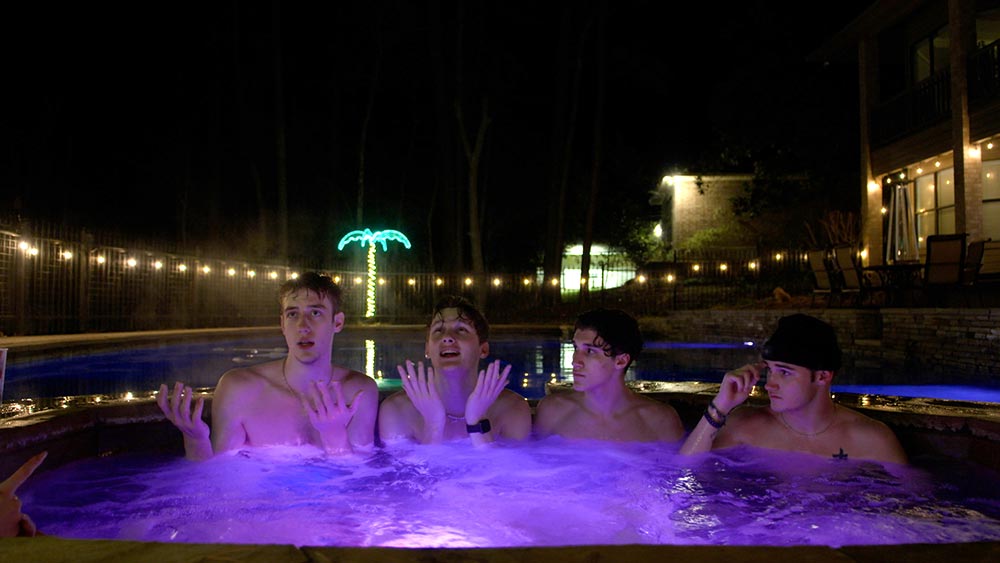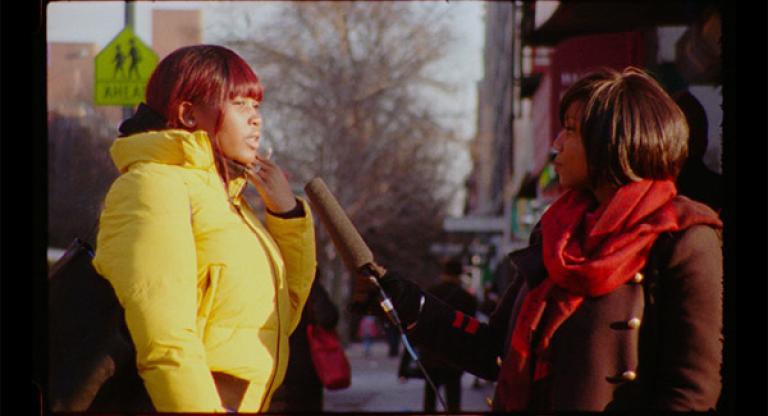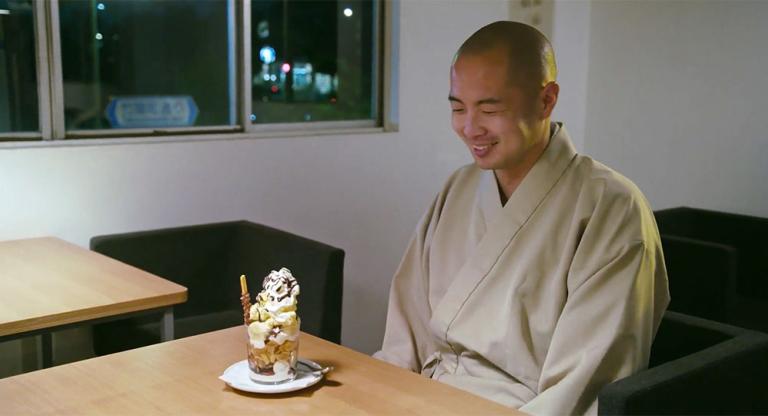The True/False Film Festival turned 20 this year—a birthday worth celebrating in an era of daunting mortality (murder?) rates among cultural institutions. Entering the festival’s homey venues across a few blocks in the university town of Columbia, Missouri, you join affable crowds chatting about documentaries from around the world, without a sense of rarefaction and without the sense that it all might end imminently. Of course, it helps that the movies are good, which they have consistently been since I first went, lo, these ten-or-so years ago. True/False’s artful curation derives largely from European nonfiction festivals with a smattering of Sundance (Going to Mars: The Nikki Giovanni Project, Milisuthando), but my favorite this year came from the unusually hefty slate of world premieres (eight).
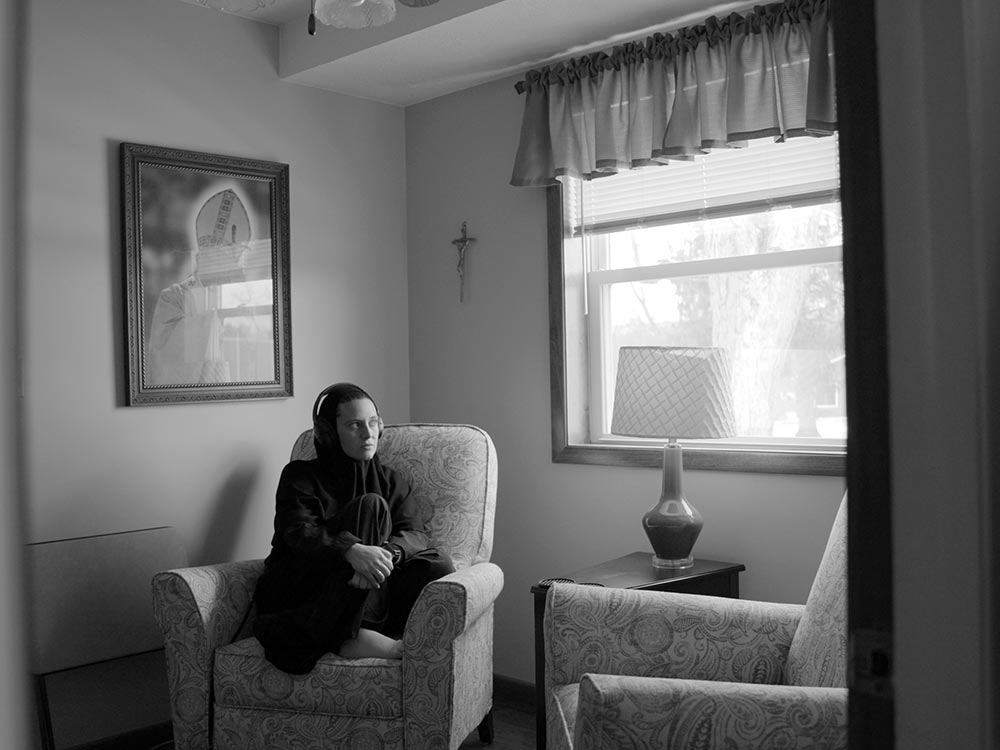
In Elizabeth Mirzaei’s outstanding Natalia, a twenty-something would-be engineer sets out on the path to becoming a Catholic nun, somewhere in America. Filmed in black-and-white, with square framing, Natalia has donned a habit to prepare alongside sisters for the novitiate, but she openly and anxiously expresses her uncertainty about leaving her former life behind: dating men, the prospect of children, the regular society of family and friends. Mirzaei (who co-directed the Oscar-nominated short Three Songs for Benazir, 2021) bucks the conventions of many cinematic studies of faith, with their static monumentality and forbidding Old World backdrop. Instead she keeps pace (emotionally and physically) with her dynamic subject and searches for scenes, moments and images that might express or reflect a glimmer of Natalia’s interiority and spirituality. A certain wistfulness can flutter into view because this is, in a sense, a farewell tour for Natalia—but stronger still is Mirzaei and Natalia’s sense of humor. That sometimes comes through in the natural juxtapositions between Natalia’s Byzantine-era calling and the trappings of modern life and suburbia—ordering fast food, going on her advising priest’s podcast, watching Star Trek on a laptop—but the contrasts are thought-provoking, not cheap. Alongside religion, it’s also just a story about a young woman pursuing personal goals despite opposition (whether out of disagreement, lack of understanding, or bias). More vividly than any documentary on faith I can remember, Natalia (and Natalia) shows how doubt can make one better understand belief.

Each year the festival adopts a theme that acts like a conceptual prompt. Oddly enough, 2023 was “This is a test”—a phrase that could apply to Natalia, or to Art Talent Show, wherein applicants to a Czech art school run a gauntlet of evaluations, interviews, and exams. But this isn’t a contest or competition doc (though it recalls Claire Simon’s The Competition, 2016); directors Adéla Komrzý & Tomáš Bojar take the perspective of the teachers. Their professional skepticism can range from sympathetic to amused to brutal. More than once, their response to students who say they make art to express themselves is to say, “So what? Wouldn’t everyone say that?” It’s mostly a spur to get students to talk about their work in different ways, but it’s wild to see played out, and one tends to feel protective of the students as they try to build and break things in novel ways. Folded into these discussions is a constant crosscurrent about evolving notions of gender and other paradigms, especially across generations. The building is entered through heavy, clunky doors that evoke the difficulty of admission, its dark lobby monitored by guards who seem sweetly grumpy, then rant about men who insist on wearing women’s clothes. In the end Komrzý and Bojar’s fondness for the artkids is evident, and their lovingly shot compositions and lens choices render studios—assemblages of brushes, canvas, debris—as entrancing still-life paintings on screen.
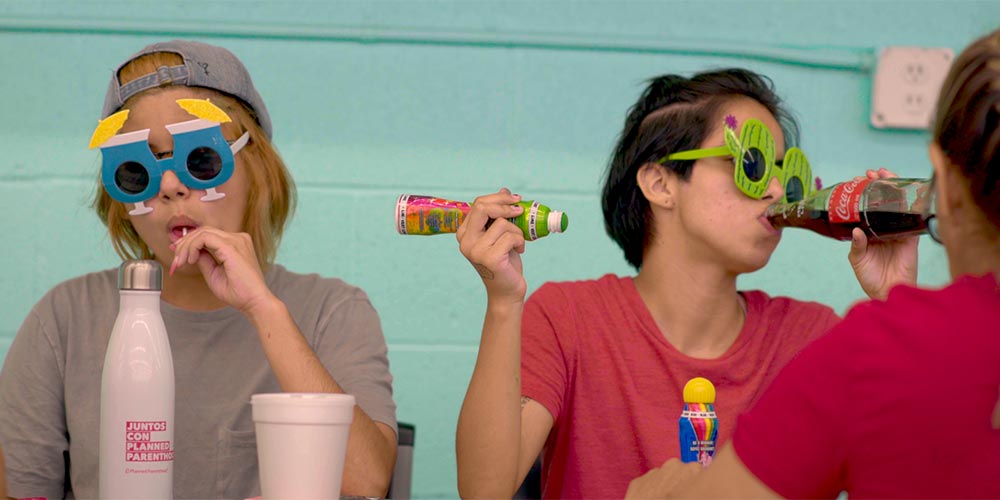
At the screening of Hummingbirds I attended, I spotted a number of filmmakers in the audience, including Victoria Linares Villegas, director of meta-doc Ramona and recipient of the festival’s True Vision award, and Chloe Abrahams, director of The Taste of Mango, a shattering picture of generational traumas. Maybe they were drawn, like me, to the lively friendship between Silvia Del Carmen Castaños and Estefanía “Beba” Contreras, the directors and stars of Hummingbirds, and their flair for self-narrative. Begun, incredibly, in their late teens, this hangout film watches the two besties tool around their well-loved hometown of Laredo, Texas, and talk things out. Though premiered in Berlin—where it won the Grand Prix in a sidebar section—the movie joins an informal lineage of movies shown at True/False about kids hanging out, like Only the Young (T/F class of 2012). Sylvia and Beba face citizen status issues and the unfathomable fears of displacement, but they push on, and they’re politically fearless, sneaking onto a lawn to change an anti-abortion sign, and keeping cool when encountering the apparatus of border control. (In my screening there was reliable laughter when they’d race and say “last one there is a Republican.”) All of this made the fleet-footed filmmaking that much more impressive. As the directors suture together what was surely a huge amount of footage, one forgets the constructedness of certain scenes (like the opening star-gazing sequence).
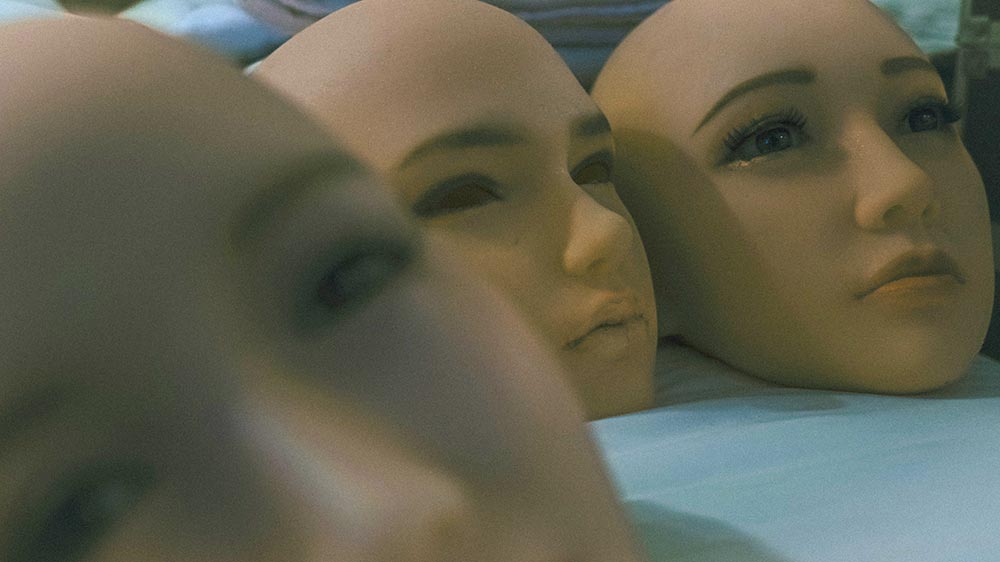
There are always films at True/False of which any description falls short of the viewing experience. Guapo’y centers on a survivor of torture and imprisonment under Alfredo Stroessner’s dictatorship in Paraguay as she finds equanimity in nature by preparing treatments of herbs and roots, and by communing with her mother, who was also jailed. Sofia Paoli Thorne’s tactile feature-length debut contains great pain in the histories of these women but also great serenity, with a lushly designed soundscape. In Su Ming-Yen’s Broca’s Aphasia, young Chinese entrepreneurs in matching black t-shirts run a sex-doll hotel, and we sit around with them (not the clients). It’s the opposite of erotic, partly a picture of pure commerce, with the ready-made uncanniness of the fleshy dolls, but it also felt like hanging out in a dorm. It’s a bit long but absorbing, complete with a lulling memoir-style voiceover by one of the dolls. Broca’s Aphasia was brilliantly paired with the absolutely riotous short Alpha Kings, in which American adolescents hawk themselves—or more specifically, their feet—on OnlyFans, as well as tirades mixing dom abuse and success worship. Tavuri follows a con man whom the Turkish director, Dervis Zaim, knew decades ago as a child. He bilks strangers over the phone with send me cash so I can send you cash scams and holds the screen with bristling confidence, though he has trouble scamming his way out of having diabetes. The film itself is an eyebrow-raising hybrid, with multiple camera setups for the simplest of moments. Zaim draws on his background in fiction storytelling for the challenge of portraying a criminal in the act, or more often, between the acts.
To conclude, a diptych of fallen empire. It begins with Time Bomb Y2K, a film composed entirely from contemporary news, archival footage, and home movies, charting the hyperventilating run-up to the disaster that never was: mass software failures when the clock struck midnight in the year 2000. Its story of ’90s techno-prophecy feels like a harmless dry run for the panic and disasters that have actually ensued in the first decades of the 21st century, from political extremism gone mainstream, to the malice and paranoia surrounding the pandemic; this history came first as farce, now tragedy. While directors Brian Becker and Marley McDonald don’t give in to the ample temptations of kitsch, I’m not sure they ever overcome the challenge of re-situating the received narratives that the news industry manufactures by habit. But the film’s finest moments come with a teenage commentary show, apparently called Hype, whose panelists are the most level-headed of anyone on screen.
Finally, How to Have an American Baby chronicles the practice of West Coast businesses that house pregnant Chinese mothers: women come to the United States so that their children will have American citizenship, and then promptly return home after giving birth. Leslie Tai’s deeply embedded look at both the client and business-owner side of the transaction only grows more complicated as it continues, perhaps no more so than when portraying the United States as almost incidental to the purposes of its subjects. Here the U.S. is less an awe-inspiring superpower dreamland and more the baby equivalent of the Cayman Islands for offshore banking. The film’s final chapter is its own beautifully sustained journey, as we follow up after one woman’s horrible trauma in a U.S. hospital to witness her home life, in a relationship with a wealthy man who is married to another woman. It was one of several documentaries that left one with a welter of feelings, and not always knowing what to think—which is a good thing.
The True/False Film Fest was held March 2-5, 2023 in Columbia, MO. Art Talent Show, The Taste of Mango and other films from T/F show in MoMI's First Look series running March 15-19.
